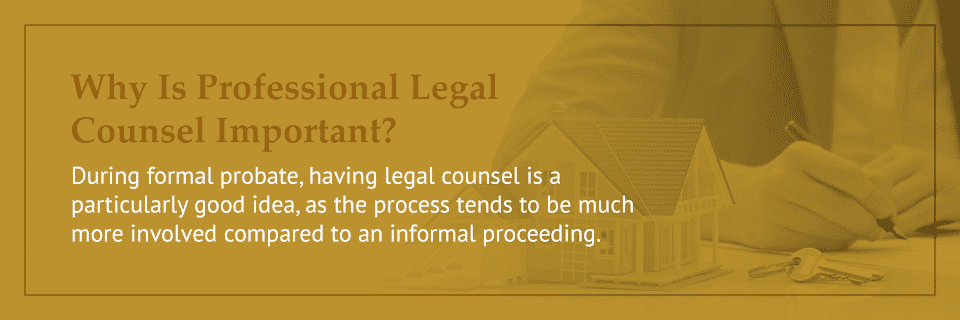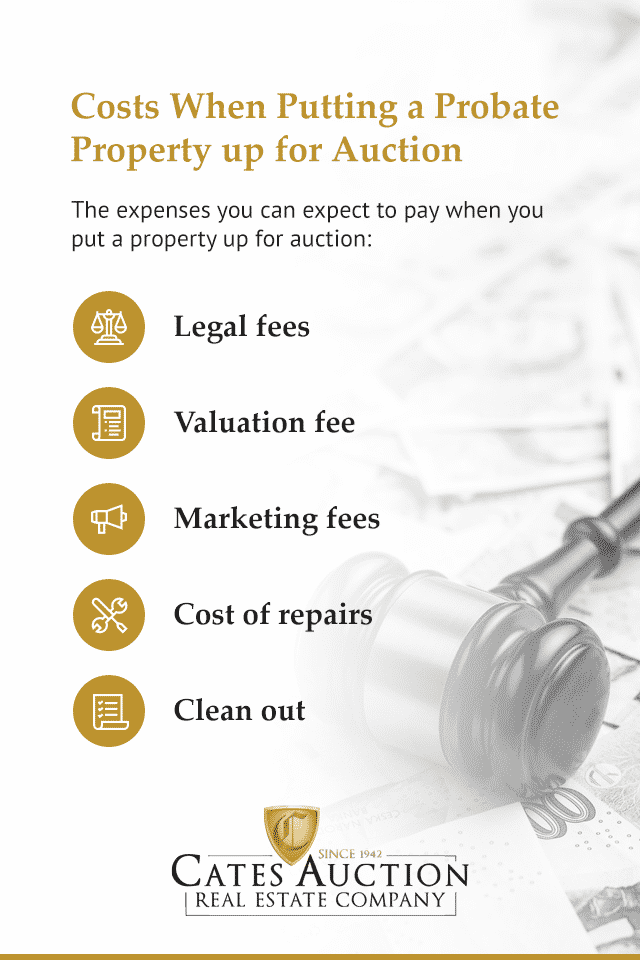
After a person passes, what happens to their possessions? It all depends on whether or not that person had a will and what their final wishes were. The value of assets or possessions a person owned at the time of their death also influences what happens to their belongings. In the state of Missouri, estates over $40,000 usually have to go through a probate process after a person’s death. In the state of Kansas, only estates with assets worth less than $20,000 can skip probate.
During probate, the court typically decides what will be done with a deceased person’s possessions. Occasionally, the home might be sold during probate so that the proceeds can be split among the surviving members of their family. Selling a home in Kansas City during probate is in some ways similar to selling a home at any other time. There are also distinct differences. If you are going through the probate process, here is what you need to understand about selling a property.
Table of Contents
- What Is Probate?
- Why Is Professional Legal Counsel Important?
- Why Sell Real Estate During Probate?
- Benefits of Putting a Probate Property to Auction
- Costs When Putting a Probate Property up for Auction
- Steps to Selling a House During Probate
- FAQs About Selling a Home During Probate
- Why Work With Cates Auction When Selling Real Estate During Probate
This article includes general information only and should not be construed as legal counsel or advice. All sellers are strongly encouraged to engage the services of a qualified attorney to answer questions and provide guidance in the probate process.
What Is Probate?
Before you learn more about selling a home during probate, it’s helpful to understand what probate is. Usually, probate is a multi-part legal process that takes place after a person dies.
If a person left behind a last will and testament, the goal of the probate process is to prove that the will is valid. If a person didn’t leave a will, the purpose of probate is to appoint an administrator of the estate and figure out how to disperse the deceased’s possessions.
People can avoid having their possessions go through probate after passing away by, for example, co-owning property with someone who has the right of survivorship or putting assets in a revocable trust. Naming a beneficiary on specific accounts also allows those accounts to avoid the probate process.
But if none of those conditions are the case, then probate is a requirement. Usually, probate involves several steps and a considerable amount of paperwork. How simple or complicated it becomes depends on how well everyone gets along or not. It also depends on the number of creditors the deceased person ends up having. Usually, the probate process in Kansas and Missouri goes something like this:
- A person applies to be the personal representative — also known as the administrator or executor — of the estate.
- If the person is approved, the court sends them a letter of approval.
- The personal representative sends a notice to all known beneficiaries, creditors, and heirs.
- The representative also publishes a notice of the deceased’s death in a local paper so that any other, unknown creditors have a chance to stake their claim.
- The representative provides proof that they have published the notice and contacted all known heirs and creditors.
- The representative takes an inventory of the estate’s assets.
- The representative divides up and distributes the assets and property, either based on the will or as seems fair.
- The representative delivers a final accounting to the court and prepares a closing statement claiming the property was distributed and that any debts were paid.
It’s important to note that the above isn’t meant to be legal counsel and that if you have any questions about probate or probate proceedings in Missouri or Kansas, your best course of action is to consult an attorney.
Why Is Professional Legal Counsel Important?
The steps above are what typically happens during an informal probate proceeding. Informal probate usually takes place when there aren’t significant disagreements or when no major obstacles are standing in the way of the process.

There might be cases where an informal probate proceeding isn’t feasible and, in those instances, a formal proceeding might be needed. Formal proceedings take place in court and usually involve a judge who approves the decisions made. During formal probate, having legal counsel is a particularly good idea, as the process tends to be much more involved compared to an informal proceeding.
Formal probate proceedings in Missouri may be unsupervised, meaning the judge is there to settle arguments or disputes but is otherwise mostly hands-off, or they might be supervised, meaning the court takes a much more active role in the process. A similar situation takes place in Kansas. The District Court usually supervises all probate proceedings, with the exception of estates that are administered under the Simplified Estates Act and Informal Administration Act.
Whether you are going through an informal or formal probate process, having an attorney on your side who is experienced in estate law can allow you to navigate the proceedings and reduce the stress and hassle of going through probate.
Why Would You Sell Real Estate During Probate?
There are a few reasons why a representative of an estate might decide to sell real estate during probate. One reason is if the deceased’s will asks that cash is distributed to their heirs, but most of their assets are physical possessions or real estate. Selling a home during probate would provide the cash that would then be given to the heirs.
Even if there’s no will, selling real estate during probate can make sense, as it converts the property to cash and makes it easier for the representative to distribute the deceased’s assets to heirs. Selling the property can also provide the representative with cash to pay off any creditors.
Benefits of Putting a Probate Property to Auction

How can you go about selling property during probate? One option is to put it to auction. Selling a home at auction is often preferable to putting it on the open market during the probate process. The benefits of auctioning real estate during probate include:
- Transparency: Auctions can be appealing for beneficiaries and the executors of the estate because the process is very transparent. The amounts people bid are out in the open, and there’s more of a chance that the seller will get the best price for the house.
- Familiarity: Probate attorneys and the court tend to be comfortable and familiar with the auction-selling method, meaning there are fewer opportunities for unpleasant surprises.
- Certainty: There’s less opportunity for a buyer to back out of an auction sale. Once the gavel falls at the end of the auction, the buyer hands over a non-refundable deposit and the contract is signed. On the open market, sales can often fall through at the last minute because of issues with financing or with the house itself.
- Less hassle for the seller: Typically, property sold at auction is sold “as-is,” so the seller doesn’t have to worry about fixing up the house or going back and forth with the buyer if the home inspection turns up any unpleasantness. In some cases, a representative can combine real estate and other property into the same auction to further simplify the probate process. Since buyers bid on the property, there’s no need for haggling or back-and-forth negotiating.
- More attractive for certain buyers: Some buyers prefer going the auction route compared to the open market. They know that the sellers are likely to be motivated to sell the property and are more likely to be realistic about the process.
- Time-saving: Since there’s no need for negotiations, inspections, or other proceedings commonly associated with the home buying process, auctions tend to take less time. The sale date is also picked in advance, so the seller doesn’t have to worry that the house will linger on the market for months.
- No commissions paid by the seller: The buyer is responsible for paying the auctioneer’s commission, which gets added to their final bid.
- Market exposure and buyer competition: Professional auctions attract more attention than ordinary listings or “by owner” efforts. Competitive bidding assures market value is obtained.
Costs When Putting a Probate Property up for Auction
Although putting a probate property up for auction is often less expensive than going through the open market or hanging on to the property, it isn’t entirely cost-free.

Here are a few of the expenses you can expect to pay when you put a property up for auction:
- Legal fees: It’s a good idea to hire an attorney to provide counsel throughout the probate process, regardless of how you decide to sell. In Missouri, attorneys are paid based on a minimum fee schedule that ranges from five percent of the first $5,000 of the estate’s value to two percent for values over $1 million. In Kansas, legal fees aren’t fixed by law, but must be approved by the probate court.
- Valuation fee: You may need to have the home appraised to determine its market value before you can put it up for auction. The average home appraiser in Kansas City, Mo., costs $314.
- Marketing fees: If people don’t know the house is for sale, they won’t come to the auction. Marketing costs can range from traditional elements like signs, mailings, and brochures, to a wide variety of digital and highly targeted online and print advertising, plus much more. When you work with Cates Auction, we put together a custom marketing campaign to make sure your property gets in front of as many qualified buyers as possible.
- Cost of repairs: Although you sell the property “as-is” and aren’t obligated to make repairs, some sellers find that fixing up the house slightly allows them to get more bids and makes the property more attractive to more buyers.
- Clean out: Homes in probate often have contents that must be removed. This might include a trash hauling service or estate sale company. Ideally, the auction company selling the house will have personal property auction services which can help avoid upfront costs.
Steps to Selling a House During Probate
Now that you have an idea of what probate is and what it costs to put a property on the market during probate, here’s what you can do to get the ball rolling and to put a house up for sale.

It’s important to note that Cates Auction & Realty Co, Inc., does not offer legal services or advise on legal matters. Nothing in this article should be construed as legal counsel and all sellers are strongly encouraged to engage the services of a qualified attorney to assist in the probate process.
1. Hire an Attorney
Before you do anything, hire an attorney to provide guidance and counsel through the probate and sale process.
2. Determine the Home’s Value
Before you can put your house for sale in Kansas City, you need to have an idea of its value. Have the value determined by someone familiar with the values of homes in your area and the current methods of determining a home’s value. You want to work with someone who has the appropriate education and credentials. It’s also important to work with someone who charges a flat fee and who won’t charge you based on the value of the property, which would create a conflict of interest.
3. Get the Court’s Permission
In Missouri, you need to file an Application for an Order to Sell Real Property before you sell a house in probate. In Kansas, the executor can file a petition to sell real estate.
4. List the House for Auction
Research auction companies that specialize in real estate. Choose the company you feel will do the best job marketing the house, based on their experience and expertise. Be certain they are fully licensed as both auctioneers and real estate agents/brokers. They should be members of professional organizations in both industries.
5. Get Approval of the Contracted Sale
In some cases, you’ll need approval from the court before you can finalize the sale of the property. Generally to be approved the sale price must be at least 75% of the recorded value.
FAQs About Selling a Home During Probate
You may still have questions about selling a house after a person passes away. Here are the answers to some frequently asked questions:
Can You Sell Before Probate?
The answer depends on who owns the house. If the deceased was the sole owner of the house, then usually the answer is no. If you were a joint owner on the property and had the right of survivorship, then you might be able to sell the property without it going through probate. Your best course of action is to consult an attorney.
How Long Does It Take to Get the Grant of Probate?
It all depends on how complicated the probate process is and on how well everyone works together. When there are disputes among family members or heirs, the process tends to take longer compared to when everyone agrees. In some cases, how long the process takes depends on how busy the courts are. Again, your best option is to talk to an attorney to find out how long the probate process will take.
Who Are the Players in a Probate Sale?
Many people are involved in a probate sale. Here are the main players:
- Personal Representative or Executor: The person responsible for dividing up and distributing the deceased’s property.
- Attorneys: Attorneys are often hired by the executor to assist in the process.
- The Court: The court supervises the process directly or has the final say in any arguments.
- The Heirs: The people who will receive assets from the deceased.
- The Buyer: The person or people who purchase the property.
- The Auctioneer: The person who oversees the auction marketing and sale.
Why Work With Cates Auction When Selling Real Estate During Probate
Cates Auction has been conducting auctions in Missouri and Kansas for decades. In that time, we’ve worked with numerous sellers who were auctioning properties during probate. We’re comfortable working within the rules and confines of the probate system and have experience working with seller’s legal counsel during the process.

Our years of experience with probate sellers and in the auction business means that we know how to customize our services to fit the needs of probate sellers and we know how to position probate properties to reach the right buyers. We also offer personal property auction service to liquidate the contents of homes we are selling.
To learn more about how we can help you sell a probate property at auction, contact us today. Someone will be in touch with you shortly with more details.
Cates Auction & Realty Co, Inc., does not offer legal services or advise on legal matters. Nothing in this article should be construed as legal counsel, and all sellers are strongly encouraged to engage the services of a qualified attorney to assist in the probate process.

